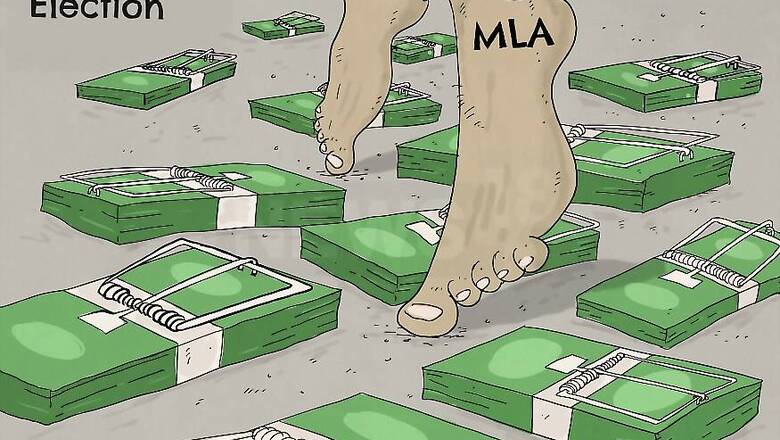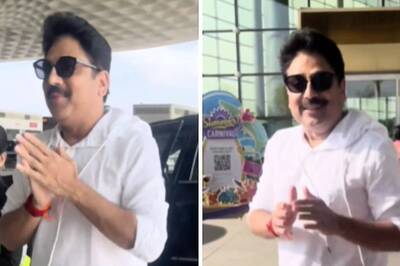
views
For 40-year old Parvathi amma (name changed), who hails from Srikakulam district in Andhra Pradesh and works as a domestic help in Hyderabad, it is slightly an uphill task to get a leave from work for a week before the state goes to polls on April 11.
When asked why would she need a week in advance to travel to a district which is an overnight journey from Hyderabad, she says the negotiations for ‘rate’ per ‘vote’ happens few days in advance.
“We have four members in our family. Usually, the rate is Rs 3,000 per vote. Sometimes, it goes up to Rs 5,000. My mother-in-law cannot walk, but we have to get her to vote, else, we will miss out on her share,” she quips awkwardly.
There are many like her across the state. Andhra Pradesh is looked at as one of the most expensive southern states when it comes to election spending. There’s huge flow of cash, liquor and other freebies on the ground.
In less than a month, cash worth more than Rs 110 crore has been seized by the agencies making it the second-highest seizure in the country.
“That is just the visible expenditure. There is a lot of invisible expenditure that is happening on the ground and that needs to be cracked too,” says Telugu Desam Party (TDP)’s Jayadev Galla, who is the richest MP in the country, according to data from 2014.
Galla, a US-returned entrepreneur and managing director of the over billion-dollar Amara Raja Group, is seeking re-election in Guntur district.
It does not come as much of a surprise in a state where most of the leaders are millionaires.
According to an independent research firm, Association for Democratic Reforms (ADR), Andhra MPs are way richer than parliamentarians from other states.
Hence, if the average annual income of an MP is a little over Rs 30 lakh, the average income of an Andhra MP is a crore —70% higher.
“There is a lot of corroborative evidence that election requires money and it is no surprise that people with a lot of money are contesting elections. Before coming to Andhra, I would like to highlight that the per capita income of India is less than Rs 1.2 lakh per year. The average income of sitting MP is Rs 30 lakh, which is nearly 30 times more,” Prof. Trilochan Shastry, Founder-Trustee of ADR, told News18.
Needless to say, Andhra voters expect all contestants to open up their purse strings ahead of any election. However, the parties blame each other for the situation.
“Ideally, a leader is expected to go to his/her constituency and ask about the issues that people are facing there. But, today, party workers go and talk to a representative, who talks on behalf of voters, in a colony, ask him about the number of voters and fix a rate for each vote,” says BJP’s Vangaveeti Narendra, contesting for the Vijayawada East Assembly seat.
“This has become routine and people expect that when you go for campaigning,” says Narendra, adding that it is tough for ordinary candidates like him to be in the fray.
He declared assets worth Rs 51 lakh. Although he hails from a political family, Narendra quit his job as a bank employee to join politics and is majorly dependent on party funds for campaigning.
So what made Andhra this rich and cash-dependent state during elections?
The trend has been there for long and Andhra is one of the first states to introduce cash distribution during elections, say analysts.
“In the 90s, consciously, the wealthiest people were sucked into politics. Until that time, that was not the case. When NT Rama Rao founded his party, Rs 25,000 was a big expenditure. In most cases, candidates spent a nominal amount and got elected. However, post the NTR phase, there was desperation for power — (Chandrababu) Naidu from the TDP and YS Rajasekhara Reddy from the Congress were very similar people (in this regard). For them, money was not important, but power was. So, they started encouraging and enticing the wealthiest people to come into politics. Just money is not enough, people want to be recognised and they want to have power and both these leaders exploited this attitude,” Jayaprakash Narayana, founder of the Lok Satta Party, told News18.
Usually a candidate in Andhra must be able to spend at least 30 times more than the Rs 70-lakh limit mandated by the Election Commission.
However, party leaders trade charges and continue to blame the opposition, despite being aware of the ground reality.
“Jagan Mohan Reddy is with the BJP and he is using the saffron party’s clout and his own corrupt practices to get money. Even TRS (Telangana Rashtra Samithi) is sending him money,” Chief Minister Chandrababu Naidu told News18.
The Caste Angle
Another strong factor dominating the elections in Andhra is caste.
On our way to Guntur, we met 60-year-old Hanumanth Reddy, who drove us to nearby villages for the day.
A quick chat with him highlighted that in most areas of the state, caste takes a priority while casting a vote, compared to other factors.
“I have been voting for Naidu since 90s. There has been quite a lot of development in the last four years. However, in 2014, I had voted for the YSR Congress, because I am a Reddy and our community decided we will support Jagan,” says Hanumanth.
The two politically dominant communities in the state are Reddys and Kammas.
While the chief minister belongs to the former, his main opposition, Jagan, belongs to the latter.
Traditionally, SCs and minorities used to side with the Congress and its leaders, which has now been replaced by the YSR Congress and Reddys.
Backward castes used to support the TDP which always had a Kamma leadership. However, of late, Jagan has been trying hard woo members of these communities and break into the Naidu vote bank.
Jagan is also welcoming Kammas to his side. Recently, NTR's son-in-law, Daggubati Venkateshwar Rao, was given an Assembly ticket by the YSR Congress.
Financially, Kammas are a very influential community with a great control over the film industry, media and other fields, but number-wise that may not be the case.
“In these elections, the increasing caste influence is going to be a drawback. Naidu and Jagan, both have support from their communities. But, Kapus and backward castes have still not taken a call. So, they are kind of going to be the deciding factor,” political analyst I Venkata Rao told News18.
Over the last decade, cash distribution and castes have dominated over other issues during elections in the state and this vicious tradition will be a hard one to break.




















Comments
0 comment